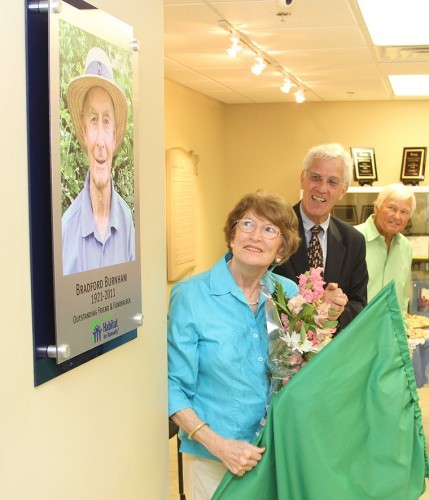
INDIAN RIVER COUNTY — Mr. Bradford Burnham was 90 when he passed, but his legacy will continue to live on through the naming of the Office and Training Center at the Indian River Habitat for Humanity complex off US 1. Through his fund- and awareness-raising efforts, Mr. Bradford got not only his own community, The Moorings, involved in building houses for the organization, but reached out to several other neighborhoods and communities to help.
“He was such a great encourager,” said Andy Bowler, president and CEO of the local Habitat for Humanity chapter during a dedication ceremony, naming the center in Mr. Burnham’s honor.
At the young age of 74, he got involved in Habitat for Humanity, working to raise money to help build more houses – and in a matter of 10 years, the organization build 51 homes under his guidance.
Mr. Burnham was a “low key, humble man,” Bowler said, addressing a crowd of about 50 people Saturday afternoon, including some of Mr. Burnham’s family.
His wife, Joan, was on hand for the unveiling, helping to reveal a plaque in her late husband’s memory in the lobby of the center.
“I am so thrilled,” she said, fighting back tears. “I am so proud of him. He worked so hard.”
Mrs. Burnham said that Habitat for Humanity was an organization that received his “loving attention” and is an amazing group. “We both loved Habitat.”
“We are so thankful for all that he did,” Bowler said, noting that Mr. Burnham did more than raise money to raise walls – he also got various communities to help, including Sea Oaks, Grand Harbor and Riomar, to name a few.
Mr. Burnham also helped to get the Habitat Home Center up and running, which funds eight homes every year. He also convinced others to remember Habitat for Humanity in their wills.
Among those who spoke during the dedication was Mr. Burnham’s younger brother, David Campbell Burnham, who recalled being young and jealous of his older brother – the one who was good with a joke and with the ladies.
“Brad was my hero and my teacher all his life,” David Burnham said, explaining he learned several lessons from his elder sibling, including that all people are of equal importance, money has nothing to do with the worth of an individual, and that “there is a good God who loves us.”
For David Burnham, dedicating not just a house but the office and training center to his brother is a fitting tribute.
“I think a house is a perfect symbol for Brad’s values,” he said – the office represents family – the human family, all under one roof.
Mr. Burnham’s son, named for his brother, David Campbell Burnham II, also addressed the crowd, sharing various letters he came across while cleaning out his father’s office.
One letter was sent to his father while on a troop carrier in the Pacific during World War II. He was 24. The letter tells his dad that he doesn’t much care about making money for a few years and that he wants to do something meaningful in his life – not just blindly enter into business upon coming home from the war.
At age 45 – approximately – Mr. Burnham wrote a letter to the rector of his church in Ohio, calling for the church’s leadership to put forth a public resolution addressing civil rights. The year was 1968 and racial and civil tension was high. In the letter, he also questioned the church’s plan to use $750,000 to build a sanctuary and classroom space, noting the money could be better spent establishing mission churches.
In 2000, he wrote a eulogy for his sister Helen, recalling a discussion they had shortly before she passed. They compared who they had voted for in the various presidential elections. Of the 15 shared elections, they voted for the same person just once.
Despite the political divide between them, they were able to respectfully discuss politics – a feat he hoped could serve as a beacon for all to put “country first and party second.”
The last letter shared was from December 2005 to his children, telling them that though he would have to spend Christmas in Florida, “playing golf on Christmas Day doesn’t fit” – not that he had time for such activities. He told them that he was far too busy raising money for Habitat for Humanity to play.
One of the many Habitat for Humanity homeowners touched by Mr. Burnham’s endeavors was Iva Powell, who routinely called him “Mr. B.”
“He responded very well to it,” Powell said, drawing a soft chuckle from the audience.
She and her three children moved into their Habitat home in 2006, a little more than a year from the start of the project.
Powell told the audience that she often wondered what made a person so special that places would be named for them, noting numerous streets, parks and buildings are often named for people.
Now she knows.
“When I think of him, I think love first and kindness second,” Powell said of Mr. Burnham. “His love and kindness are still present in my life today.”
It is that love and kindness that will carry on through the Burnham Center’s work for Habitat for Humanity.



